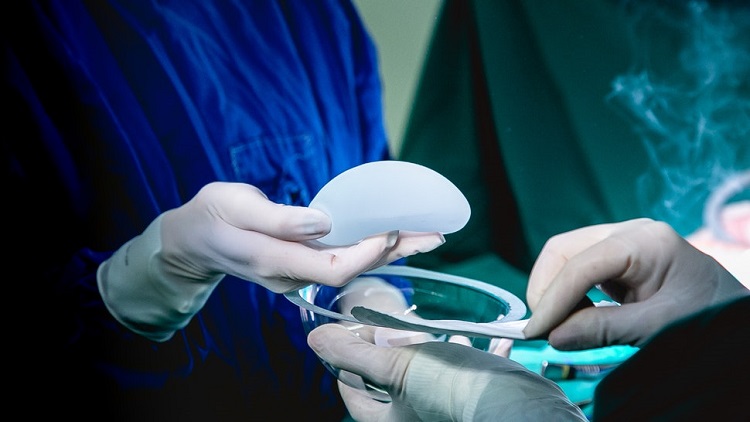Watch to find out more about the recall.
[rumble video_id=v5d5e9 domain_id=u7nb2]
Breast implant maker Allergan voluntarily issued a worldwide recall of its Biocell textured breast implants and tissue expanders upon the request of the US Food and Drug Administration after the products were linked to a rare type of cancer.
An Allergan press statement said: “Allergan is taking this action as a precaution following notification of recently updated global safety information concerning the uncommon incidence of breast implant-associated anaplastic large cell lymphoma (BIA-ALCL) provided by the U.S. Food and Drug Administration (FDA).”
Compared to other countries, macro-textured implants (the type that Allergan produces) take up only 5% of all breast implants sold in the United States, said the FDA.
Dr. Binita Ashar, director of the office of surgical and infection control devices at the FDA, said, “It’s our estimation that hundreds of thousands of women have these implants,” while adding that more details about these numbers will be coming in the next few weeks.
The following textured breast implant products were recalled: Natrelle Saline-Filled breast implants, Natrelle Silicone-Filled breast implants, Natrelle Inspira Silicone-Filled breast implants, and Natrelle 410 Highly Cohesive Anatomically Shaped Silicone-Filled breast implants. The following are the tissue expanders that were recalled: the Natrelle 133 Plus Tissue Expander and Natrelle 133 Tissue Expander with Suture Tabs.
As early as 2011, the FDA also found a possible link between breast implants and the occurrence of breast implant-associated anaplastic large cell lymphoma, or BIA-ALCL, which is a rare type of cancer. While the agency doesn’t recommend removal of the breast implants if there are no symptoms of BIA-ALCL, people should be aware of what those symptoms are and monitor the area where the implants are.
Should any symptoms surface, they should immediately contact their doctor.
The main symptom is pain or swelling around the area where the implant is and this can happen years after the implant procedure. The FDA has recorded 573 cases around the world of BIA-ALCL stemming from breast implants as of earlier this month. Additionally, 33 patient deaths were also reported.
Dr. Amy Abernethy, the FDA’s principal deputy commissioner of food and drugs, said in a statement: “Although the overall incidence of BIA-ALCL appears to be relatively low, once the evidence indicated that a specific manufacturer’s product appeared to be directly linked to significant patient harm, including death, the FDA took action to alert the firm to new evidence indicating a recall is warranted to protect women’s health.
“We will continue to monitor the incidence of BIA-ALCL across other textured and smooth breast implants and tissue expanders as well as other devices intended for use in the breast. If action is needed in the future, we will not hesitate to do what is necessary to protect patients.”
The FDA Medical Devices Advisory Committee’s General and Plastic Surgery Devices Panel already met in March to discuss how the agency will continue monitoring breast implant safety.
Dr. Jeff Shuren, director of the FDA’s Center for Devices and Radiological Health said, “We will continually evaluate any new information and may, as a result, take action regarding other breast implants, if warranted.
“In addition, we are continuing our assessment to determine whether the risk of developing BIA-ALCL is limited to specific models of textured, or all textured breast implants. We continue to advise women and health care professionals that the use of breast implants is associated with a risk of developing BIA-ALCL and that the risk is greater with textured implants.”
The agency is also mulling on recommendations to add a boxed warning on the labeling of breast implants to better inform users of the possible health risks.
According to the American Society of Plastic Surgeons, the most popular cosmetic procedure last year was breast augmentation.
Most of the women have no serious complications from the implants, up to 20% of women with implants need to have the implants taken out within 8 to 10 years because of complications, said the FDA.
Dr. Tommaso Addona, a plastic surgeon and president of the Long Island Plastic Surgical Group in New York, said in March, “Breast implants are not meant to be lifetime devices. They have a lifespan, and that might range from seven to 10-plus years, based on the implant and patient.”
This is why he makes sure his own patients are aware of both the benefits and risks.
“We do discuss complications. Those range from scarring around the implant, sometimes soreness and discomfort from the implant … to in the last seven years, probably a bit more, we’ve become more acutely aware of a specific type of lymphoma that is associated with breast implants,” he said.
“What the general public should appreciate is, as doctors and clinicians, we always want what’s best and safest for our patients. We’re constantly not only educating ourselves but educating our patients.”




